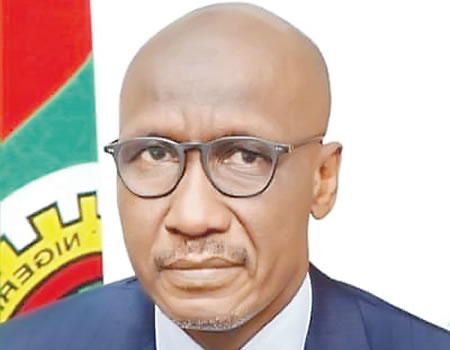AFTER three years in the saddle as Group Managing Director of the Nigerian National Petroleum Corporation (NNPC), Dr Maikanti Baru’s tenure ended yesterday as the new GMD, Mr Mele Kolo Kyari, takes over the management of the corporation as from today.
Being the nation’s cash cow, Nigerians are interested in the direction in which he will steer the corporation.
Perhaps the issue that has been on the front burner for a while is that of subsidy removal. Christine Lagarde, outgoing Managing Director of the International Monetary Fund (IMF), had said at the Spring Meetings of the IMF/World Bank in Washington, USA, that given the low revenue mobilisation in the country, with respect to tax to Gross Domestic Product, it was important for Nigeria to remove fuel subsidy. Although this resonated with many players in the industry as well as experts, the Nigeria Labour Congress (NLC) called on the government to ignore the counsel of the Bretton Woods institution.
Earlier in February, ahead of the last presidential election, Professor Yemi Osinbajo, while speaking at the Vice Presidential debate organised by the Broadcast Organisation of Nigeria and the Nigeria Elections Debate Group, had said the government was reluctant to stop the subsidy regime because of its effect on the masses. According to him, removal of subsidy could push the pump price of PMS to as high as N220 per litre.
He had said, “The NNPC is the sole importer of petroleum. So, it is from the balance sheet of the NNPC that the subsidy is being taken. Now, let me say that if today, you are to remove subsidy, petrol price could go as high as N220 per litre or higher. There is no country in the world, not even the wealthiest ones that don’t run some type of subsidy or the other.”
While the government and the labour movement seem to share the same view of retaining the status quo with respect to retaining the subsidy regime, industry players and experts are of a different view.
Speaking on the issue of subsidy, Professor Wumi Iledare, former President, Nigerian Association for Energy Economics (NAEE), said the subsidy regime was not sustainable because it deprived the country of the fund required for social welfare.
He said, “Unfortunately, the current subsidy model is not sustainable. That is what ran Petróleos de Venezuela, S.A (PDVSA) in Venezuela and the country aground. Honestly, petroleum products subsidy is a gorilla in the Nigerian economy, next to debt financing, a budget buster, an exchange rate volatility driver and the key determinant of excessive social welfare loss in the country.”
He said the new GMD should take the issue of pushing for total removal of subsidy seriously.
Professor Adeola Adenikinju, Director, Centre for Petroleum, Energy Economics and Law, University of Ibadan is also of the opinion that subsidy for PMS should be done away with.
In an interview he said, “There is a lot of misinformation about who benefits from subsidy. Those who benefit now are the importers and the rich people. The rich are getting a larger portion from subsidy compared to the poor people. We should find areas the poor can also benefit from; rural healthcare centre, education, rural roads and scholarships, among others.”
He added, “When you subsidise a product, and you are not subsidising production but subsidising consumption, there is no incentive for the producers to go to the bank, borrow money and put up the refineries because our country’s policy is unpredictable. The pricing policy is controlled by the government. There is no bank that would give you any loan if the economy of your project is not right, if you don’t have a bankable project on hand; if your commercial feasibility is not right; if there are a lot of political risks involved as subsidy creates a lot of risk because it is not predictable. Therefore, those people prefer to import. When you import, you just bring in the thing, you supply and get paid. Whereas if there is a subsidy and you produce locally, they will ask you to sell at the domestic price and you are not exactly sure who is going to pay the difference between your cost and the selling price. So, subsidy distorts the signals that investors are getting.”
While speaking at the Nigeria Oil and gas Conference recently, Group Managing Director of Oando, Mr Wale Tinubu, described fuel subsidy as one of the issues hurting the country’s oil and gas industry and the economy.
According to him, “Government has chosen to effectively subsidize the price of petroleum products as a social palliative, not that we support. The debate about subsidy is one that needs to be made.
“The oil industry absolutely needs to challenge and champion the debate on subsidy removal. But, there is long-term damage to our country’s economy and the oil and gas industry with the continuous payment of petroleum subsidy. We need to ensure the subsidies are halted,” Mr Tinubu said.
Many experts and industry players are also of the view that the government should fully deregulate the downstream sector of the oil industry.
According to Mr Raymond Okeke, CEO of Adonai Associates, Lagos, the refusal of government to fully deregulate the downstream sector of the oil industry constitutes a disincentive to investors.
He explained, “In 2016, ExxonMobil divested its stake in Mobil Oil Nigeria. In the same year, Oando Plc divested 60 per cent of its stake in its downstream business, and just recently, Femi Otedola divested 75 per cent of his stake in Forte Oil, opting to invest in power generation. What this indicates is that unless the sector is fully deregulated, investors would not be attracted into it. Mr Kyari should agitate for the full deregulation of the industry.”
Professor Adenikinju also said full deregulation was the way to go to maximize the potential of the industry.
He said, “It is only when investors are convinced that they would get full value for their investments that that they would deploy their resources to a venture. With full deregulation, they know that market forces would determine how much they would sell their products, then they are able to invest in the industry. That is what is happening with electricity right now. There is what is called partial credit guarantee scheme in the electricity sector now. What that means is that those who generate electricity have the guarantee of the World Bank and the Federal Government that when they generate even if the buyers do not pay, both the World Bank and the government will pay.”
Another issue that many Nigerians want the new GMD to pay attention to is the passage of the Petroleum Industry Governance Bill (PIGB).
Speaker of the House of Representatives, Mr Femi Gbajiabiamila, spoke the mind of many Nigerians when he said last week that the ninth assembly would give priority to the passage of the PIGB so as to consolidate and reposition the oil and gas industry for the benefit of all Nigerians.
The PIGB, which was first introduced as the Petroleum Industry Bill (PIB), was conceived over 15 years ago. The PIGB is expected to birth an efficient and effective governing system with clear roles for the petroleum industry. It is also expected to facilitate and promote accountability in the administration of petroleum resources in the country. With the PIGB would come the establishment of the Nigerian Petroleum Regulatory Commission (NPRC), which would serve as the regulatory body for the nation’s oil and gas industry. The import of this is that the Department of Petroleum Resources (DPR) and the Petroleum Products Price Regulatory Agency (PPPRA) would be scrapped as their functions would be taken over by the NPRC.
The PIGB was first passed by the Senate in 2017 with the House of Representatives following in tow shortly after. The harmonized positions of the two chambers formed the bill that was presented to President Muhammadu Buhari for assent in 2018. However, the president withheld assent because, according to him, the bill would deprive the three tiers of government of revenue. The president said the NPRC would be controlling so much money that it would deprive the states and the local governments of revenue.
However, many Nigerians are of the view that the new GMD should champion the signing of the PIGB.
According to Okeke, “The PIGB is quite important to position the country to immensely benefit from the industry. The major challenge of the industry is opaqueness and this is principally due to the fact that NNPC, which performs the functions of a regulator, is also a player in the industry. If Mr Kyari means well for the industry, it is best that he pursues the passing of the PIGB with vigour.”
Speaking in a similar vein, Prof Ilebare said the new GMD should lend support to industry reform.
He added, “The new GMD must put his weight behind the reform efforts and not be an impediment to it. A quick passage of the PIGB is in his interest. He needs a technical board to deliver dividends to his stakeholders. He needs funding autonomy to be a national oil company that compares with its peers. A political board with a minister as the chairman continues to leave much to be desired, in my opinion.”
Okeke also noted that the GMD should endeavour to achieve the daily oil production target of 2.3million barrels so as to make the government’s revenue target realistic.
“For a while, the country has had the challenge of funding its budget. Almost every year since this administration came on stream, the government borrowed more than it had planned. This is because most of the time the oil production target is not achieved due to a number of factors. The new GMD would do well to ensure that every hindrance to achieving the target is removed with a view to halting the incessant borrowing by the government to fund budgets.”
Speaking about the capacity of the new GMD, Professor Ilebare said, “That his management team is capable is not an issue. They are mostly inbreed and I hasten to speculate that empirical evidence suggests that inbreed NNPC management teams have done far better than those invited from outside, Marino, Adams, Obaseki, Kupolokun, and Baru are classical examples. I have worked and interacted with the majority of the new team and I wish them very well with the hope that they will work as a team.”






